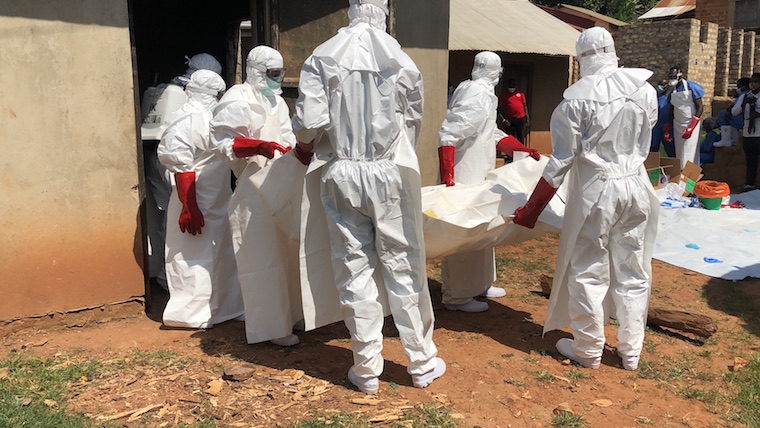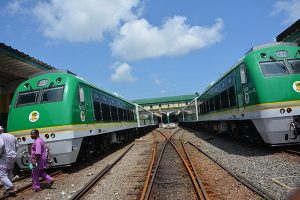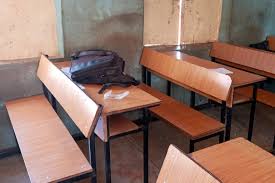Covid-19 bodies will be buried within one hour

With the recent climb in Covid-19 cases drawing the most public notice of late, health officials have begun to think about fatalities.
So far 78 individuals have been trained to carry out safe and dignified burials (SDB) in the undesirable event that the country starts losing lives to the novel coronavirus disease (Covid-19).
The SDB teams consisting of 26 people each from all sectors including humanities, who went through an intensive five-day training at the Uganda Red Cross Society offices in Lubaga.
Related Stories
- 2020-06-09 – Burundi President dies ‘of heart attack’
- 2020-06-09 – Gen Kasirye Gwanga dies at Nakasero hospital
- 2020-06-05 – Demise of Kirunda reveals Fufa’s purge on ex-internationals
Uganda is yet to lose a single person to Covid-19 but officials say training of SDB teams is part of the emergency response plan to the Covid-19 pandemic. President Museveni earlier said government shall take over the burial of any Covid-19 deaths.
While presiding over the passout of the teams last week in Lubaga, Dr George Upenytho Dugumu, commissioner, Health Services (Ministry of Health), said the SDB team must be on standby at all times.
“Don’t keep waiting for a call. Don’t keep checking social media to see how many have died today then you start saying; let me pick my bag, pick my shoes…No. From today, have a separate bag. Inside that bag have a separate shirt, separate shoes, separate trousers and put it aside because we can call you any day,” Upenytho said.
He said once called upon, the SDB team is expected to reach the site of the burial within about three hours and bury the body within the next one hour because it is highly infectious and a risk to the deceased’s family, undertakers and mourners if not managed well.
Dr Charles Olaro, director, Curative Service at the ministry of Health, said unlike Ebola, with Covid-19 deaths, family members are allowed at the burial of the victim and the SBD team must uphold and respect the burial practices and cultures of the deceased.
He said the safe and dignified burial is aimed at keeping the dignity of the deceased even in death and also keep mourners safe from further infection.
“In relation to Covid or any other condition, it is actually our anticipation that nobody dies, but all of you as you know, this is not the truth of it. Even in the Bible, there will be a time for death,” Olaro said.
“Preparing this team doesn’t necessarily mean that we want people to die but we’re looking at; if this eventuality does happen, then we’ll be able to have a team that will be able to handle it. I also want to mention that when people fall sick, there are normally two outcomes – to improve and be discharged but you can also be discharged when you have died,” he added.
Irene Nakasiita, head of communications and public relations at Uganda Red Cross Society, said they have spent a minimum of Shs 500m to train the teams largely because the training and burial materials used had to be imported from abroad. She said, the International Federation of the Red Cross, International Committee of the Red Cross, German Red Cross and Netherlands Red Cross all pooled resources to have the materials flown into Uganda.
She said even before the passing out of the new SDB teams, government had already asked URCS to carry out safe and dignified burials of four persons who died not necessarily from Covid-19. She said the four deaths were highly suspicious and could have led to further infections.
Among these, was a body flown into Entebbe airport from abroad at the time when the airport was closed, another was a man at the Uganda-Kenya border who was said to have committed suicide but government asked Red Cross to bury him.
Another was a taxi driver who died from his house in Kampala during the lockdown while another was a resident of Bundibugyo.
“It [SDB] is part of the emergency response, and death has to be factored in, and just because Uganda hasn’t yet registered any deaths, it doesn’t mean death can’t happen…With the increasing number of coronavirus cases, death might be inevitable and incase it happens we have to be prepared,” Nakasita said.
Border areas of Bundibugyo, Kasese, Kisoro, Bunyangabu, Ntungamo that are prone to Ebola outbreaks have SDB teams but the burials of each victim of an infectious disease is different according to Dr Olaro. The SDB teams are actually required to carry out a simulation before the actual burial so as to avoid making mistakes.



